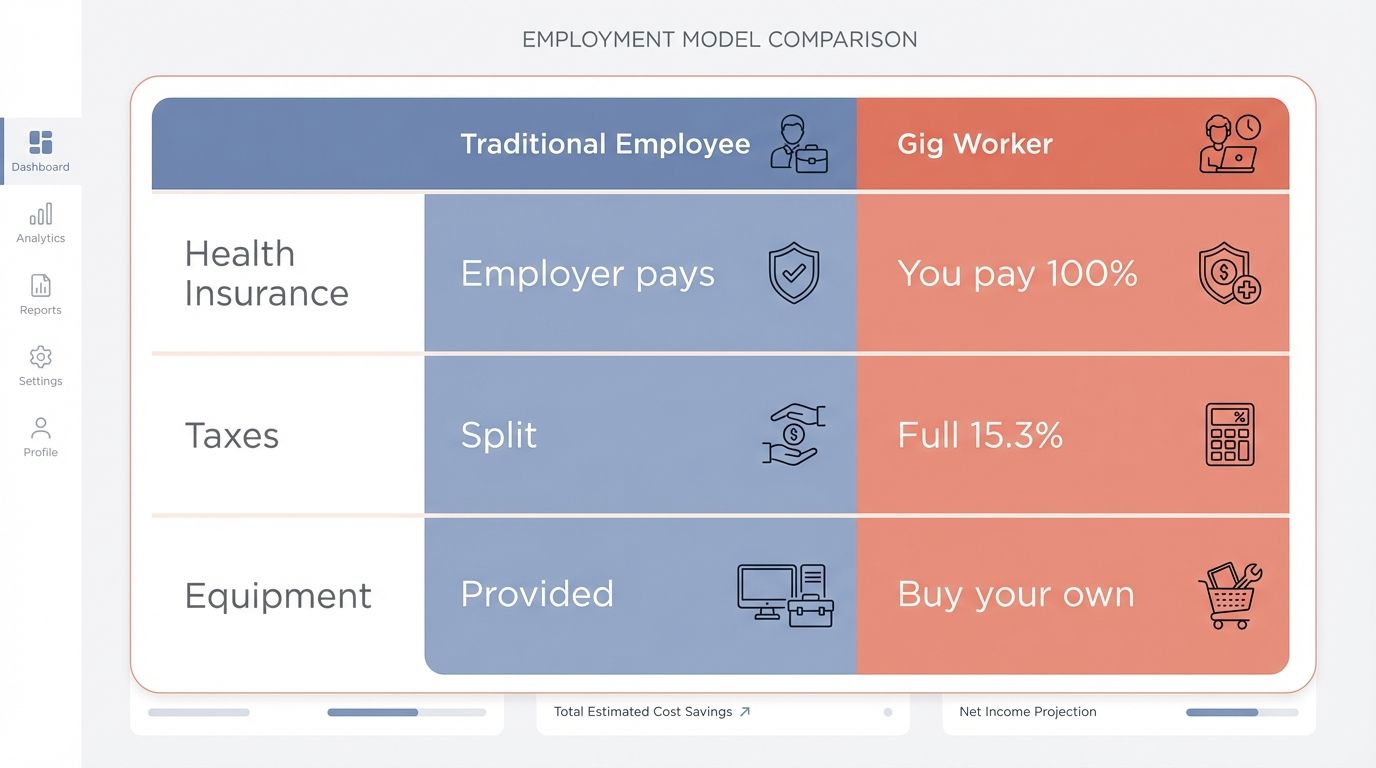Have you ever felt like your current job is running on deprecated code? You are not the only one looking for an upgrade. When I saw that the U.S. workforce participation in the Extreme Geek Economy had jumped from 38% to nearly 62% in recent reports, I realized this is no longer just a trend. It is a system update.
This post unpacks how new tech stacks, remote work protocols, and high-level skills are rewriting the job market.
I want to show you how to leverage these changes to build a career that fits your life.
Grab your favorite beverage, and let me walk you through the six critical insights that could upgrade your income.
Key Takeaways
Massive Adoption: By 2025, reports indicate that up to 70 million Americans will be freelancing, with 37% of gig workers now relying on it as their primary income source (TransUnion 2024).
Platform Dynamics: Tech giants like Upwork and Fiverr drive this engine, but user fees vary wildly; Upwork is moving to a variable 0-15% fee structure in 2025, while Fiverr sticks to a flat 20% commission.
Skill Premium: Specialized talent pays off; senior Rust developers can command $150+ per hour, significantly outpacing generalist web developers who often cap at $60-$70 per hour.
The Benefit Bug: Financial instability remains a feature, not a bug; 54% of workers lack employer-backed health insurance, and the self-employment tax hits hard at 15.3% of net earnings.
Tech Tooling: New tools like GitHub Copilot Workspace and compliance platforms like Deel allow solo-preneurs to operate with the efficiency of a full enterprise team.
Table of Contents
What is the Extreme Geek Economy?

Moving past the basics, I see the Extreme Geek Economy as the gig economy on steroids. It is freelance coding, software development, and high-end digital consulting supercharged by AI and global connectivity.
People like me pick up temporary jobs, sometimes through platforms like Upwork or Fiverr, but often through specialized channels. While some folks drive for Uber or Dash, the “Extreme Geek” sector focuses on high-value outputs like building Rust-based systems or training AI models.
According to TransUnion’s 2024 report, 37% of gig workers now rely on this income as their main paycheck. That is a massive shift from “side hustle” to “main hustle.”
This mix of independent contractor work creates a scenario where “Every project is a stage and every worker is a headliner.” The term “gig” started with jazz musicians, but now it covers everything from a 30-minute troubleshooting session to a six-month fractional CTO role.
Employers use this flexible labor market to hot-fix talent gaps without the overhead of payroll taxes or long-term benefits. For geeks who want flexibility, the Extreme Geek Economy fits right in with our desire to control our own stack.
Key Features of the Extreme Geek Economy
I see tech platforms popping up everywhere, giving freelancers new tools to score gigs. Specialized knowledge is cash. Project management apps like Trello and payment systems like Wise keep contracts smooth, even for pros working from a home lab.
How do flexible and temporary work structures operate?
Flexible work structures run on short-term jobs or “sprints.” I often see this setup with consumer platforms like Uber Eats, Instacart, but in the tech world, it looks different. As a freelancer, I might take a contract to migrate a database to AWS one week and then teach a Python workshop the next.
This type of self-employment means no long-term deal with a single boss. The internet acts as the API connecting me to clients globally. I can earn USD while sitting in Chicago or sipping espresso in a Tokyo cafe.
 The Reality of Benefits:
The Reality of Benefits:
| Feature | Traditional Employee | Gig Worker (You) |
|---|---|---|
| Health Insurance | Employer pays ~70-80% | You pay 100% (Avg $450-$600/mo for Silver ACA) |
| Taxes | Employer pays half of FICA | You pay full 15.3% Self-Employment Tax |
| Equipment | Company laptop provided | You buy your own rig |
I handle my own taxes and juggle health benefits myself since these projects rarely come with traditional perks. Employers avoid paying for unemployment insurance by using freelance contracts. This keeps their expenses low but pushes the risk onto us.
Labor standards are loose. This lets me pivot fast—moving from coding to consulting—but job security costs me the certainty of a bi-weekly deposit.
What tech-driven platforms and tools are used?
Uber and Airbnb changed the game, but for geeks, the tools are more specific. Upwork and Fiverr are the big marketplaces, but they work differently.
- Upwork requires you to be active. You use “Connects” to bid on jobs. It is great for long-term contracts but requires constant pitching.
- Fiverr is passive. You set up a “Gig” (like “I will fix your CSS bug”) and wait for clients to order. It is better for productized services.
Getting paid is smoother thanks to tools such as PayPal and Payoneer. However, a pro-tip I learned is to use Wise (formerly TransferWise) for international clients. PayPal often charges a hidden 4% markup on currency conversion, while Wise uses the mid-market rate.
I use LinkedIn and Instagram for marketing my digital content creation gigs. Cloud computing lets me stash files online, while 5G keeps everything speedy.
AI-driven apps have shown up too. Tools like ChatGPT-4o or Midjourney act as force multipliers, letting one person do the work of three. If you want another layer of fun while learning about globalization, try out some interactive global economy games. They helped me grasp big ideas way better than textbooks alone.
Why is specialized knowledge important in this economy?
After seeing so many apps shape gig work, I noticed that generalists struggle while specialists thrive. My experience shows that deep knowledge in niche areas like Rust programming or cybersecurity forensics leads to higher salary offers.
For example, while a general web developer might charge $60 per hour, a specialist in AI/ML engineering can easily command $150 to $200 per hour on platforms like Toptal or Arc.dev.
Digital platforms make it easy for skilled independent contractors to find work across borders. This creates a busy global labor market where specialized talent really shines. Having rare tech skills helps me pick projects that fit my interests and expertise while avoiding jobs that feel boring.
In crowded spaces such as e-sports or ride-hailing tech support, being one step ahead gives me more job satisfaction. Specialized knowledge means I can negotiate rates better—a key to personal finance growth.
Common Jobs in the Extreme Geek Economy
I work with many who write code, fix tech problems, create content on YouTube, or even coach players in gaming. If any of that grabs your attention, keep reading.
What roles exist in coding and software development?
I see friends who run code, patch firewalls, or set up digital cloud spaces. Some dive into software development as engineers, crafting the apps that keep the economy humming.
Others work as a computer network architect, piecing together systems so remote work can stretch from San Francisco to Seoul. Cybersecurity experts play shield for sensitive data. With over 500,000 unfilled cybersecurity jobs in the US alone, the demand is massive.

“Code is never just code—it’s building blocks for our whole geek world.”
My old college roommate became a database administrator and now solves puzzles for big players. Coding roles branch out fast. Project managers plan tech sprints, while information security analysts look out for breaches. With jobs in IT expected to grow significantly, it is no wonder new labor policies pop up often.
How does technology consulting fit in?
Software developers create the backbone, but technology consultants play a key role too. I help organizations face changes brought on by remote work and new tools.
Many companies struggle to manage self-employment tax issues or handle intellectual property rights for workers around the globe. This is where platforms like Deel and Remote.com come in. They handle the legal compliance so I can hire a contractor in Germany without violating local labor laws.
My daily tasks often involve helping businesses keep up with fast-moving innovations. Some days I break down how to adjust labour standards so freelancers do not fall through the cracks.
Sometimes I advise on creating portable employee benefits. Think of me as a guide—showing workplaces how tech tools can make flexible work more accessible and fair.
What does digital content creation involve?
After discussing consulting, I notice digital content creation feels like its zany cousin. I find myself writing articles on tech trends one day and making quirky graphics for a meme page the next.
These gigs pop up on big platforms you know: YouTube, TikTok, Instagram. Monetization is changing, though. Twitch recently updated its Partner Program for 2025, now requiring streamers to broadcast on 6 unique days with an average of 75 viewers. It is a clearer path, but still a grind.
I put myself out there every time I post or stream. That is risky business if privacy matters to you. Security threats lurk everywhere. The “work from home” buzz sounds cool until you realize a strong Wi-Fi and some common sense are your only shields against trouble.

How are gaming and e-sports part of this economy?
Gaming and e-sports fuel job creation through roles like coaches, shoutcasters, analysts, and digital designers. These are not just side hustles. Full-time gigs now drive serious consumer spending.
The US e-sports market revenue is projected to hit over $1.2 billion in 2025. This pushes tech innovation in game engines and streaming platforms like Discord or Twitch.
I see tournaments filling stadiums, much like traditional sports do—with fans buying tickets using both real cash and coins seen in worlds dealing in fictional currency.
E-sports has even caught the eye of policymakers seeking to adapt labor policies. The sector’s influence ripples across educational fields too, teaching coding skills that fit right into today’s tech-driven labor market needs.
What Are the Benefits of the Extreme Geek Economy?
I can set my own schedule with just a laptop, using Slack and Trello to organize projects anywhere. This freedom gives me space for wild ideas that could bring the next big thing.
How does it increase worker autonomy?
I set my own schedule. Flexible work structures let me pick projects that fit my skills. In this space, I skip the drama of office politics.
I choose who to help and where to work. On platforms like Upwork or Fiverr, I list services and decide what rates make sense for me. No haggling with HR about raises.
My career path is not tied to one company. Even if the unemployment rate goes up, I control how much risk I take. I can handle my banking with freelancer-focused banks like Bluevine or Lili, which offer features like automatic tax savings buckets that traditional banks lack.
What opportunities for innovation does it offer?
With each boost in worker autonomy, I see the geek economy throw open doors for new ideas. Digital platforms make it simple to test oddball business plans without emptying my bank account.
AI tools such as GitHub Copilot Workspace spark wild gig categories. A single dev can now go from “issue” to “pull request” in a fraction of the time, effectively acting as a full dev team.
Since barriers stay low, millennials quickly experiment with side hustles. Many workers who got laid off now dream up tech-driven services—from coding workshops on Zoom to game design consults through Discord.
How does it enable global access to work?
New ideas drive change, but digital labor markets flip the script on access too. Now, I can pick up a software development project from Tokyo at breakfast and consult for a tech startup in Germany by dinner.
Digital platforms break down barriers. AI tools help make my work faster and more accurate. Over 70 million Americans are expected to tap into freelance gigs by 2025.
Technology gives everyone a real shot at joining global teams without ever leaving home soil. For geeks like me who love learning new skills, these changes feel like rocket fuel for my career growth.

What Challenges Does the Extreme Geek Economy Face?
I face wild swings in pay and jobs that vanish overnight. If you think this gig life is smooth sailing, keep reading.
Why is job security often lacking?
Job security often slips away because work comes and goes based on project availability. Most jobs run on tech-driven platforms where algorithms decide who gets gigs.
I do not always have much say over which ones appear for me. A National Institute of Health study found that gig workers had lower mental health scores than folks with regular jobs, linking it to loneliness and financial insecurity.
This uncertainty leaves me on shaky ground if bills pile up. Companies keep labor costs low by using flexible setups instead of offering stable employment.
How does income instability affect workers?
Unstable income makes my brain run wild with worry. I struggle to set a budget since every paycheck seems like a mystery box. Saving for big goals feels almost impossible.
Without steady earnings, stress levels spike fast. I find myself checking platforms at odd hours, hoping for the next gig notification.
Tool Tip: To manage this rollercoaster, I use YNAB (You Need A Budget). Its “Age of Money” feature helps me live on last month’s income, breaking the panic cycle of waiting for a client check to clear.
What limitations exist regarding benefits?
I discovered that 54% of gig workers go without health insurance or paid leave. Platforms treat us as independent contractors. This means I pay for my own coverage.
The self-employment tax takes a noticeable portion—15.3% straight off my net earnings. I have to set aside up to 30-40% of what comes in just for taxes.
To fight this, I use Stride Health. It is a platform specifically for gig workers that helps find ACA tax credits. It can often bring premiums down to manageable levels, but you have to be proactive about it.
How Technology Shapes the Extreme Geek Economy
Smart platforms like Upwork, Discord, and Twitch have flipped how I find gigs. AI tools such as GitHub Copilot feel like extra brains on my team.
What role do smart platforms and AI-driven tools play?
I see how digital labor platforms changed my workflow. Artificial intelligence tools now pick the right jobs for me by sorting tasks using algorithms. They match my skills to client needs fast.
AI brought gig jobs I would not imagine ten years ago—testing AI assistants or training machine learning models. My reputation on each platform matters more than ever since these systems rank people with complicated formulas.
These decisions affect what clients see my profile. The concealed logic in these codes keeps information restricted, impacting my bargaining power.
How is remote work facilitated by technology?
Smart platforms do more than connect me to clients. They shape how I work. Thanks to dependable internet, video calls are easy.
My favorite group chats live on Slack, Microsoft Teams, or Discord. These keep everyone in sync. Cloud services like Google Drive and Dropbox let me share files faster than passing a flash drive.
Tech even makes hybrid offices possible. One catch: owning all these gadgets and paying for software eats into my income. It is a hidden cost many gig workers face.
How Will the Extreme Geek Economy Evolve in 2025?

Freelance platforms are projected to see their value skyrocket to $13.8 billion by 2030. I expect around 70 million gig workers in the U.S. alone next year.
AI-powered tools are about to take center stage. Sixty percent of freelancers count on them for skill development. Younger folks will continue leading this charge; seventy percent of us in this economy are under thirty-five.
Companies need more specialists. Nearly eighty percent plan to hire freelancers in 2025 just to fill talent gaps. High-earning coders and designers could hit an average yearly income of $108,028.
I also see new incentives popping up as businesses scramble to attract niche skills that AI cannot easily replace yet—think cybersecurity pros or cloud architects ready at a moment’s notice.
People Also Ask
What is the extreme geek economy, and how does it affect the labour market?
To me, this term describes the booming high-skill freelance sector where 4.7 million US independent workers now earn over $100,000 annually. It shakes up the traditional labour market by shifting power to tech-savvy contractors who prioritize high-value projects over long-term tenure.
How do companies incentivize workers in this evolving labour market?
Beyond standard remote options, I see employers offering deep value perks like fertility benefits—now standard in 86% of large tech firms—and dedicated mental health stipends to attract top talent. These incentives prove that companies know they must support our personal well-being to keep us engaged.
Why should regular employees care about shifts in the geek-driven labour market?
You should pay close attention because 92% of all US jobs now require digital skills, and possessing them is the only way to secure the average 23% pay premium that comes with technical literacy.
Can small businesses compete for talent in this high-speed environment with big players?
Absolutely; small businesses actually drove 52.8% of all net new US jobs recently by offering agility that giants simply can’t match. I often see peers choose a smaller shop for the creative freedom and equity potential, valuing ownership over a predictable corporate salary.
References
https://www.abacademies.org/articles/the-rise-of-the-gig-economy-benefits-drawbacks-and-future-prospects-17297.html (2024-11-29)
https://www.mckinsey.com/featured-insights/mckinsey-explainers/what-is-the-gig-economy
https://www.investopedia.com/terms/g/gig-economy.asp (2025-08-20)
https://nativeteams.com/blog/what-types-of-technology-have-helped-the-gig-economy-grow (2025-11-10)
https://www.park.edu/blog/the-gig-economy-shaping-the-future-of-work-and-business/
https://www.rasmussen.edu/degrees/technology/blog/types-of-it-jobs/ (2022-03-28)
https://www.bls.gov/ooh/computer-and-information-technology/ (2025-08-28)
https://www.thecgo.org/research/tech-enabled-gig-jobs-policy-solutions-for-the-future-of-work/
http://privacyinternational.org/long-read/5013/creating-content-gig-economy-risky-business (2023-01-26)
https://www.wgu.edu/blog/pros-and-cons-gig-economy1808.html (2025-04-15)
https://datafielderinc.com/remote-work-hybrid-models-and-the-gig-economy/ (2024-12-13)
https://blog.theinterviewguys.com/the-state-of-the-gig-economy-in-2025/ (2025-11-10)
